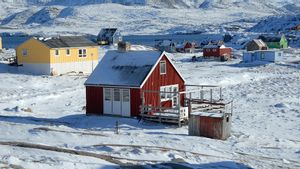JAKARTA - Chile's President Gabriel Boric announced plans for the nationalization of his country's very large lithium industry. This highlights the growing filtration technology to revolutionize this metal production for the electric car industry.
In a national speech broadcast in prime time, Boric said that a new state-owned company would work to reduce the environmental impact of lithium production by switching from evaporation ponds that are usually used to remove metal from salt water, and switch to direct extraction of lithium (DLE).
While neighboring countries, Bolivia, as well as General Motors Co, Rio Tinto Ltd, and other companies, have made their bets on DLE technology, Boric's move is the largest ever-ever support for this commercially unproven suite of technologies, given its plans to implement them across Chile's vast lithium reserves, which is the largest in the world.
"This is the best chance we have of turning to a sustainable and developing economy," said Boric, a 37-year-old left stream elected president at the end of 2021.
DLE technology is designed to extract metal from salt water in Chile's Atacama Desert and elsewhere around the world using filters, membranes, ceramic grains, or other equipment that can usually be placed in small warehouses.
While some companies are working to develop different versions, the big promise of DLE technology is an increase in global lithium production with a much smaller footprint than open mines, as well as evaporation ponds that are often the size of several football fields and are not liked by the local community.
Many DLE technologies use a lot of clean water and electricity. No one has managed to work independently on a commercial scale. If Chile can help one or more DLE technology succeed, this will strengthen its dominant role in the global lithium and EV industries over the next few decades.
"The satan is in detail, but it's a great opportunity for technological innovation in salt water treatment, after all," said Chris Berry, an independent lithium industry consultant, about Boric's plans.
SQM and Albemarle Corp, two lithium manufacturers already in Chile, used evaporation ponds to produce metal. Both are studying DLE, although it has not implemented it. Livent Corp uses variations of DLE technology in Argentina along with evaporation ponds.
"Now the regulatory agency is forcing this issue, it will only accelerate innovation and commercialization," saidten Egan, privately owned CEO of EnergyX, who is building a DLE test facility north of Chile and has a development project with GM.
Several well-known companies, such as Lake Resources NL,tender Energy Resources Ltd, Renault SA, and Stellantis NV, support the DLE project. Lake Resources teamed up with Lilac Solutions Inc, backed by Bill Gates, to use DLE Lilac technology in Argentina. Lilac even plans to open a DLE test facility in Chile in the coming weeks.
However, some of the people involved in the lithium business pointed out that DLE technology from Lilac and Standard Lithium Ltd were unsuccessful, a charge rejected by the two companies.
Despite the Chilean government's plan to nationalize lithium, DLE companies see business opportunities in the country as new state lithium companies are expected to require technical support.
"Whether nationalized or not, they will need technology," said Amanda Sanregret of Summit Nanotech Corp, who recently opened the DLE trial office and facility at Santiago.
The discovery of this environmentally friendly technology will provide great benefits to the environment and the lithium industry. In addition, it can meet the increasingly high demand for lithium, which is used in electric vehicle batteries and other electronic devices.
The English, Chinese, Japanese, Arabic, and French versions are automatically generated by the AI. So there may still be inaccuracies in translating, please always see Indonesian as our main language. (system supported by DigitalSiber.id)









